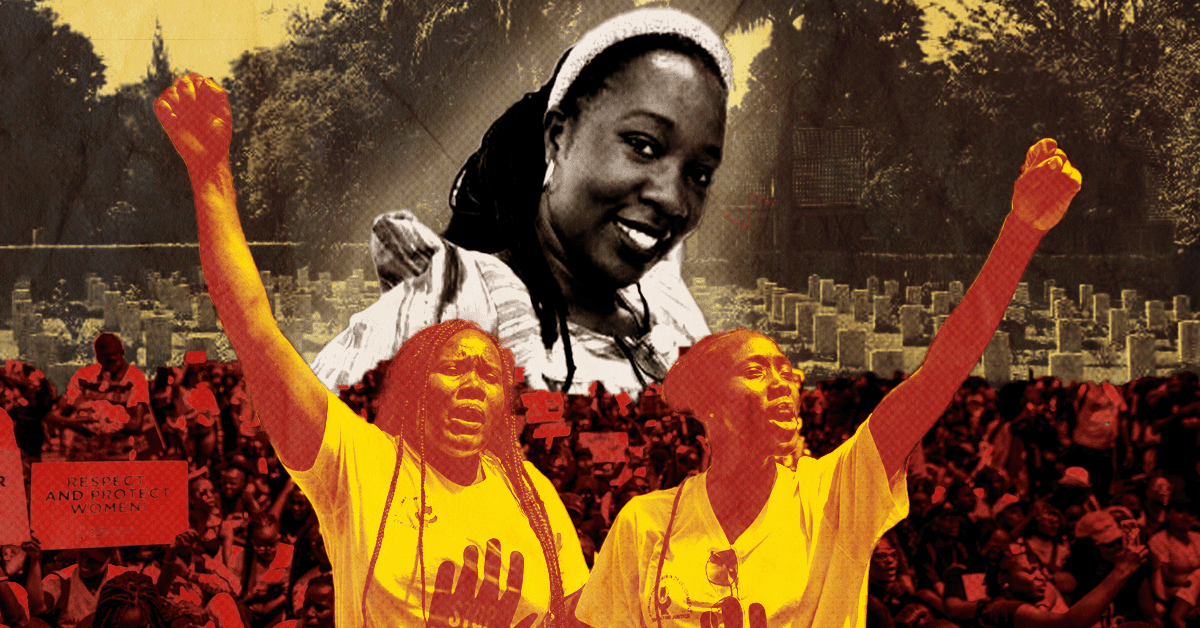Uganda’s “role model” men are working to end violence against women
- Northern Uganda has long been plagued by widespread gender-based violence, with the remnants of the Lord's Resistance Army conflict leaving lasting scars on the social and psychological fabric of the region. Is an approach to engage men working?
Five years ago, Harriet Okello, 37, a resident of Kuru-Otit village, Omoro District in Northern Uganda, and a mother of five left home and divorced her husband Richard Okello, citing physical and alcoholism-related violence.
It was the third time that she had returned to her parents in just a space of less than twelve months. The physical violence and psychological torture from her husband seemed not to end.
“He would come back in the middle of the night drunk and beat up everyone for no apparent reason. This would happen every day until I took a stand,” she recounts.
In an attempt to reconcile and salvage their marriage, Richard Okello assembled a team of men from his family and clan. However, these efforts were futile. Harriet’s parents insisted on tangible proof of transformation before they could release their daughter again.
“Even my parents were tired of my repeated trips to their house. They were tired of my husband’s repeated apologies,” she adds.
At that point, they had sired three children who according to her were the reason she was enduring.
“The thought of leaving my children behind or them being parented by another woman was worrisome,” Harriet says. “I have seen children suffer at the hands of their step-mothers and I didn’t want to imagine the same happening to my children.”
Northern Uganda has long been plagued by widespread gender-based violence, with the remnants of the Lord’s Resistance Army conflict leaving lasting scars on the social and psychological fabric of the region.
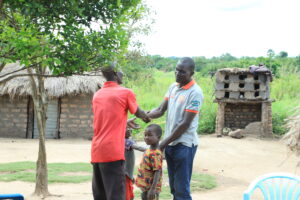
A 2021 National Survey on Violence in Uganda conducted by the Uganda Bureau of Statistics (UBOS) revealed that 95% of respondents from the Northern region had at least experienced physical or sexual violence from a partner or a non-partner, just like Harriet Okello.
The same report indicated that only 17.4% of sexual and gender-based violence survivors reported to ‘service authorities’ like the police as compared to 41.1% who trusted local leaders.
The three times that Harriet left were an example of the several times that she was battered and made to spend the night outside. She narrates that many times she was threatened into silence hence fearing to report.
The police, according to Milly Okao, the women representative on the local council haven’t helped in apprehending most of the culprits. She says that even when the survivors report, they are always advised to go back home and try to patch up things.
“Many survivors have lost trust in the police. The family unit always pushes for reconciliation, even when it is clear that the right thing to do is to apprehend the culprit,” she argues.
Role model men
While on the journey to repair his broken marriage, Richard Okello desperately approached Francis Owaka, 54, one of the men who is part of a movement that is working to bring an end to gender-based violence in their communities, to help ‘fix it’ for him. He volunteered to head a delegation that ensured that Okello and his wife were reunited.
Owaka is one of the 240 men spread across the four districts of Omoro, Gulu Nwoya and Amuru who are voluntarily working to bring an end to gender-based violence. This initiative was pioneered in 2011, exactly four years after the Lord’s Resistance Army insurgency ended.
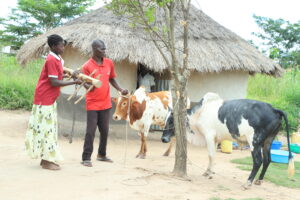
Mobilised and trained by the Gulu District-based not-for-profit Gulu Women Economic Development and Globalization (GWED-G), these men work as change leaders in areas of human rights, sexual reproductive health/rights, and women empowerment, among others as a multi-sectoral approach to end GBV.
“We were working with women groups and empowering them with seeds and domestic animals, in a bid to recover from the war,” says Geoffrey Oyat, the GBV prevention manager at GWED-G. “On follow-up, we were told by most women that the men were wasting away everything. The women were working alone!”
The fight against GBV has dominantly been spearheaded by women across the divide. The men have largely taken a back seat and have generally been profiled as the majority perpetrators.
“Just like their title, these men act as role models to other men in their communities, call out perpetrators, and offer counseling to the couples and families around them,” Oyat adds.
Each role model man (locally known as laco makwiri in the Luo dialect) is attached to ten households within his neighbourhood, where he makes regular visits to the assigned homesteads and forms a community-level accountability structure that keeps families, especially men in check.
They are entrusted with the vital task of supervising, mentoring, and sensitising households on the devastating consequences of gender-based violence. The communities select their own role model men based on their exemplary character and integrity.
“Families are getting united again. Even the number of women who go to antenatal check-ups with their husbands has increased,” Oyat says. “In the past, men in this region would never care about what a woman is going through during pregnancy.”
The customary land tenure system vis-à-vis GBV
Patriarchal norms grant men of this region greater control over land and land-related decisions, leaving women with limited access and vulnerability to economic dependence on men.
Ownership and inheritance practices also favor patrilineal lines, restricting women’s rights to inherit or own land independently hence making them economically reliant on male family members/spouses and susceptible to gender-based violence.
“As men drink away at a local joint, their women cultivate crops on land that they have no control over. When the harvesting time comes, the men dictate on how to manage the produce and often sell it to return to the bar,” explains Miria Akello, the local council women representative of Kuru-Otit village.
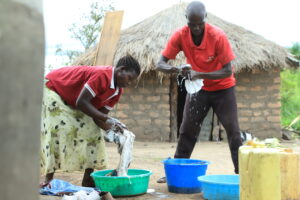
Akello argues that though the role model men have been vital in reducing GBV in her village, it is still not scaled out enough to completely stamp out the vice. Francis Owaka says that there are only four role model men that are ideally assigned to only 40 households, in a village of over 1,000 households.
“We can’t be everywhere. We can’t be in every bedroom. We can only address what we can see and what is reported to us. Fighting this vice needs wide sensitisation and a general cultural norms shift,” Owaka aptly comments.
According to Akello, even among the men they are working with, they still see cases of GBV, “and that’s why we exist to continuously work with the men.” He acknowledges that their approach is just one piece of a larger puzzle.
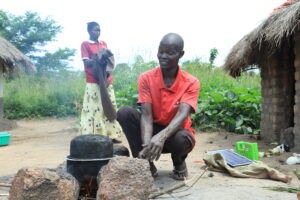
On the warm Saturday afternoon that we visit, we find Okello peeling sweet potatoes for lunch, as his wife Oyat helps with the laundry. In a typical traditional homestead setup, it is unheard of for men to take part in domestic chores.
Harriet Akello admits that it is still a work in progress for her husband as he “occasionally relapses into stints of anger,” echoing Akello’s points on the concerns with the approach.
“It is not that he is perfect. It is not that all of a sudden, he has totally become a faultless man. But the signs are positive,” she says.
“My husband is now reformed. It is just hard to imagine that he no longer joins other men in the trading centre at the bar. He is fully involved and he lets me make some of the family decisions,” Harriet Okello says.
Dan Ayebare is a journalist with Solutions Now Africa, a newsroom focused on covering solutions across Africa.


